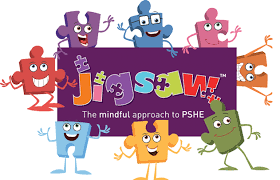PSHE
Why is PSHE important?
PSHE education gives children the knowledge, skills, and attitudes they need to:
-
Stay healthy and safe
-
Form strong relationships
-
Understand themselves and others
-
Be confident, kind, and responsible members of their community
By embedding Jigsaw into our curriculum, we aim to nurture the whole child—academically, emotionally, socially, and spiritually
Jigsaw is a comprehensive, whole-school PSHE (Personal, Social, Health ) programme used in our school to support children’s emotional wellbeing, personal development, and understanding of the wider world.
Jigsaw brings together PSHE education, emotional literacy, social skills, and spiritual development in a structured and age-appropriate way. It meets all statutory requirements for Relationships and Health Education and helps children thrive as individuals and members of society.
Why do we use Jigsaw?
We use Jigsaw because it:
-
Supports the development of confident, respectful, and resilient learners
-
Builds strong emotional and mental wellbeing
-
Helps children understand and manage relationships, health, safety, and change
-
Is inclusive and representative of diverse people, families, and beliefs
-
Provides consistent language and strategies across the school
What do children learn?
Jigsaw is split into six key themes, known as “Puzzles,” which are taught in every year group:
-
Being Me in My World – understanding identity, responsibilities, and belonging
-
Celebrating Difference – respecting diversity and tackling bullying
-
Dreams and Goals – setting personal goals and developing resilience
-
Healthy Me – physical and mental health, nutrition, safety, and substance awareness
-
Relationships – building and maintaining positive, respectful relationships
-
Changing Me – understanding growing up, puberty, and changes in life
Each year group studies the same puzzle at the same time, creating a whole-school focus and supporting collective assemblies and activities.
How is it taught?
Jigsaw lessons include:
-
Calm openings and mindfulness practice to settle children and develop focus
-
Discussion and story-based activities to explore values and experiences
-
Opportunities for group work, role-play, and creative tasks
-
A strong emphasis on empathy, respect, and active listening
Every class uses a Jigsaw character (such as Jigsaw Jenie or Jigsaw Jino) to guide the learning in a fun and relatable way.
